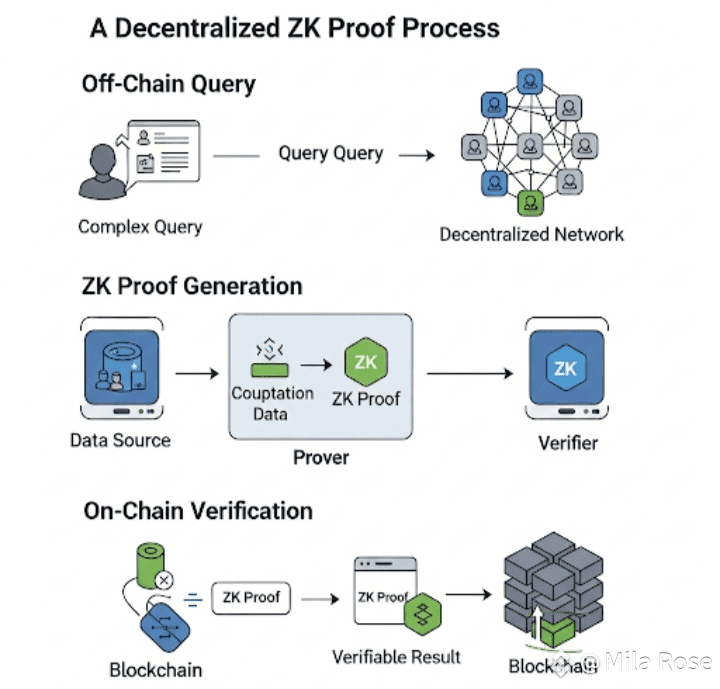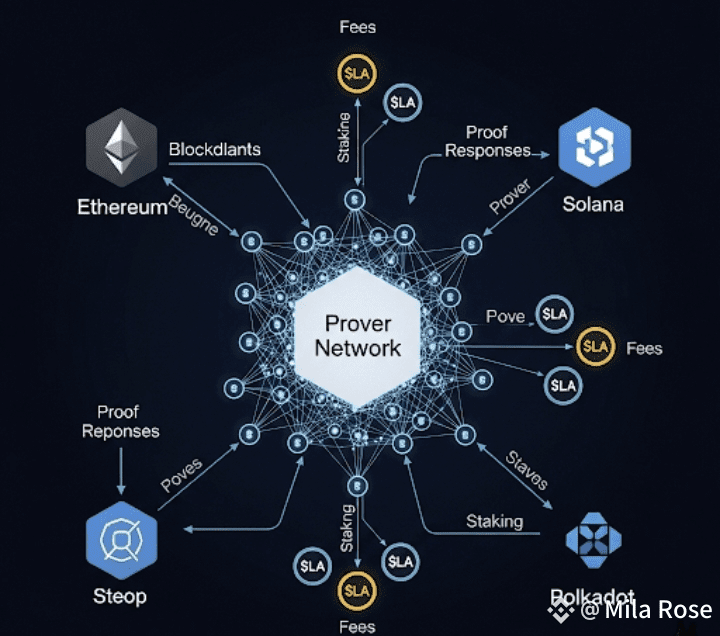We’ve all heard of Zero-Knowledge Proofs (ZK) as a solution for scalability and privacy. But what if ZK technology could be a decentralized, on-demand supercomputer for the entire blockchain ecosystem? That’s the visionary promise of @Lagrange Official . They’re building an incredibly powerful infrastructure layer that goes far beyond simple proof generation, acting as a "ZK Coprocessor" to perform complex, off-chain computations and bring back verifiable, on-chain results.
From Trustless to Verifiable
The real magic of Lagrange isn't just that it performs a computation; it's that it performs it verifiably. In a world where AI models are making critical decisions and cross-chain bridges are moving billions, how can we truly trust the data? Lagrange solves this with its decentralized ZK Coprocessor which can take a massive computation like verifying an AI's output or an SQL query over billions of blocks and generate an immutable ZK proof. This proof can then be verified on-chain proving the computation's correctness without revealing any of the underlying data. It’s a leap from simply trusting a service to being able to cryptographically verify its every action. This is the foundation of a truly verifiable internet.
The Mechanics of Verifiable Computation
Lagrange’s architecture is a sophisticated blend of a decentralized ZK Prover Network and its ZK Coprocessor.
The ZK Coprocessor: This is the core engine. It allows developers to query vast amounts of historical blockchain data and perform complex computations off-chain. By pre-processing this data into a ZK-friendly format, it makes tasks that would be gas-prohibitive on-chain both fast and affordable.
Decentralized ZK Proof Network: This network of professional operators is responsible for generating the ZK proofs. By leveraging decentralized networks and collaborations with platforms like EigenLayer, Lagrange ensures that the process is not only efficient but also highly secure and decentralized. Operators stake $LA tokens to bid for proof generation tasks and face slashing if they fail to perform correctly, ensuring a high level of reliability.
Cross-Chain Interoperability and Verifiable AI: Lagrange’s technology is designed to be cross-chain, enabling trustless communication between different blockchains. This means a smart contract on one chain can securely verify a state on another. Additionally, their infrastructure supports verifiable AI, allowing for the cryptographic verification of machine learning model outputs, a game-changer for AI and blockchain convergence.
A New Narrative
Lagrange sits at the intersection of some of the most compelling narratives in crypto: ZK, modularity and AI. Their collaboration with EigenLayer, a leader in restaking, is particularly significant. It creates a "symbiotic" relationship where Lagrange leverages EigenLayer's decentralized security to enhance its network, while EigenLayer gains a powerful ZK proving service. This alliance positions Lagrange as a critical infrastructure layer for the entire modular blockchain ecosystem. The recent multi-chain verification and ZK Coprocessor upgrades along with their new partnerships, show they are actively building on this vision.
My clear step-by-step infographic showing how a complex query is sent off-chain to a decentralized network a ZK proof is generated and then a verifiable result is sent back on-chain.
My diagram illustrating a decentralized network of provers (nodes) with connections to various blockchains and showing the flow of $LA tokens for staking and fees.
What are your thoughts on ZK proofs enabling a new era of verifiable computation beyond just scalability? Do you believe ZK is the key to building a truly decentralized internet? Tell me in comment!



